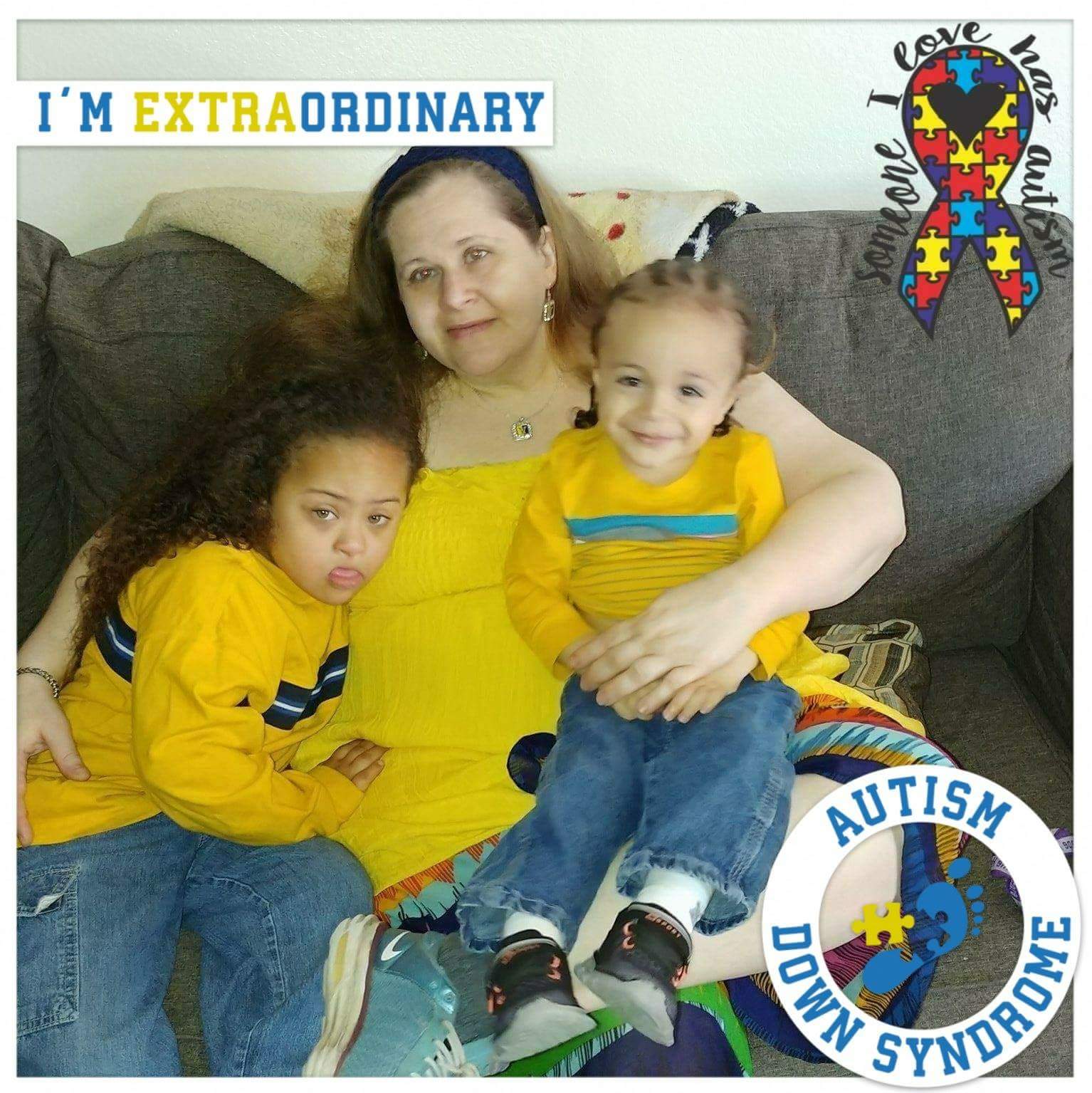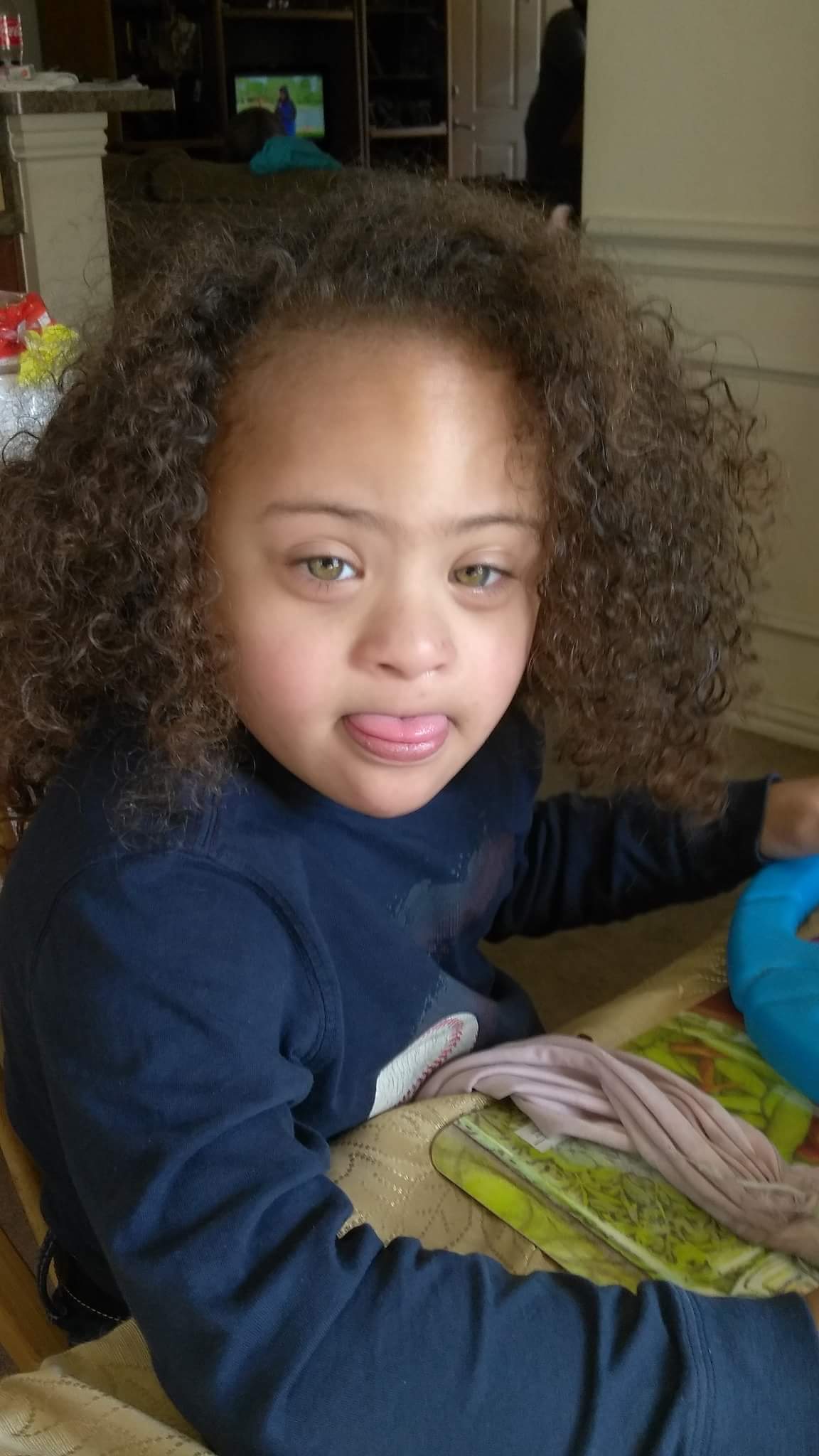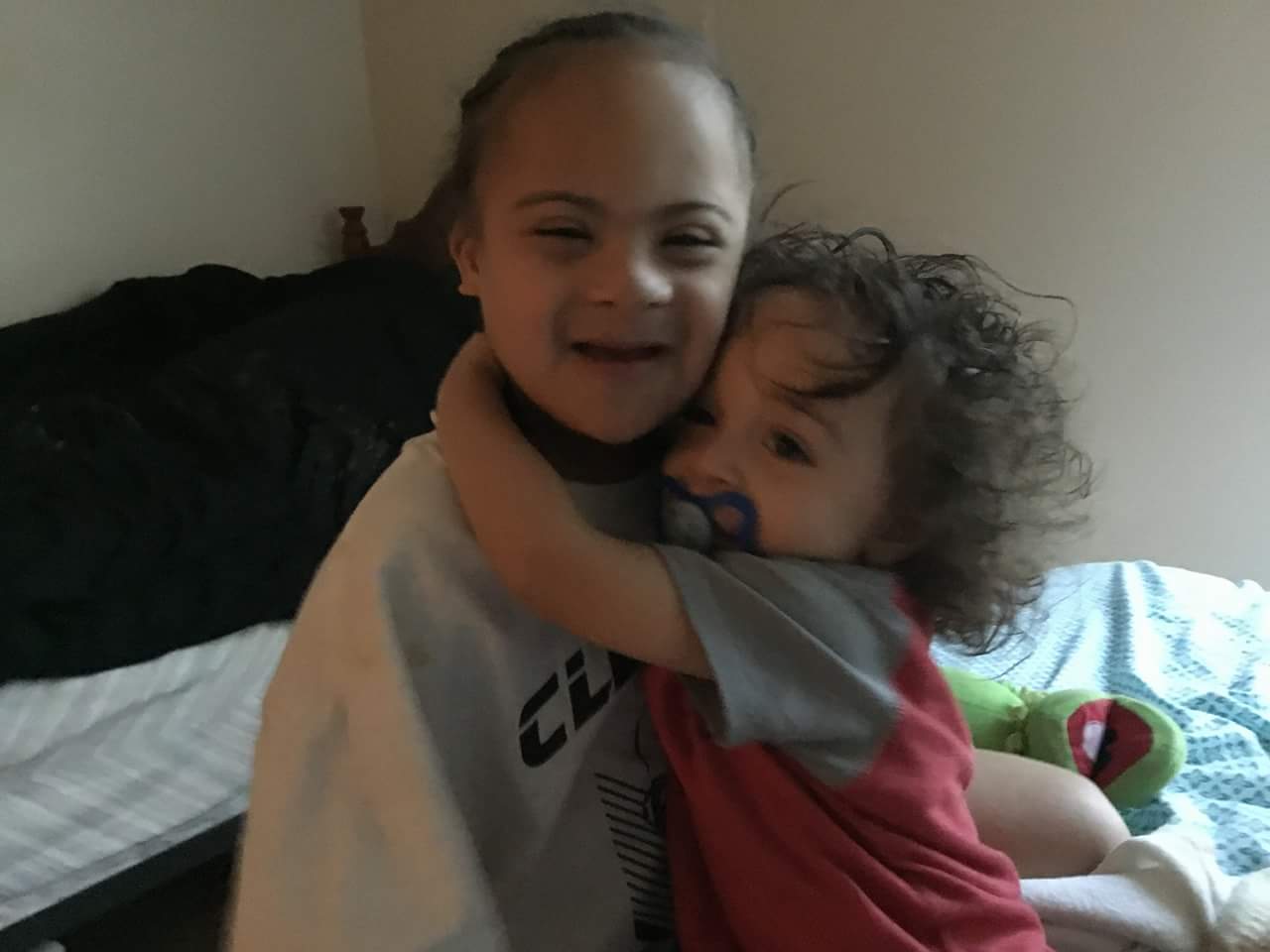Service Dog for Special Needs Child
Fundraising campaign by
Charlise Lyons
-
US$0.00Donated So Far
Campaign Story
Hi,
I'm Charlise,
For those of you that like brief and concise...
The short version is I'm trying to raise funds to get my oldest son Leontonē (Lee-on-toe-knee) ( Leon+Tony= Leontonē) who is dual diagnosed with Down Syndrome and autism an autism assistance dog. They can be taught to Track, tether, ground, deep pressure and more!
These skills require the dogs have lots of training and handlers make trips to learn to handle them. Additionally they need specialty gear as well as standard things all dogs need like veterinary care, food, treats etc. All that adds up!
The range I'm seeing is $17,000-$30,000 per dog. This IS NOT including application fees that range from $50-$500 or the hotel/ food and travel expenses it takes to attend required handling lessons and or the initial supplies like crate , collar, license, working harness etc, or initial veterinary package and check up. Service dogs and related costs are NOT covered by Medicaid. Having the funds expedites the process . I'm low income raising 2 boys. ( I do have income just not a lot) I could REALLY use your help with this mission of getting a service dog into our family. Thank you in advance! ❣️
For those of you that want detail.... Want to REALLY know where your money is going...
The more extended version is My son
Leontonē ( Lee-on-toe-knee) ( Leon+Tony=Leontonē) is 7 years old and dual diagnosed with Down Syndrome and autism. He's also non verbal. That doesn't mean he's not smart and opportunistic He absolutely is. For instance he's so smart he can put himself in danger to get what he wants. A common danger/ issue for kids with autism ( and sometimes also Down Syndrome) is elopement. ( Running off)
People not familiar with autism tend to judge the parents as negligent when these events occur and CPS gets called but trust me the best parents of autistic children face this delema every day! ( They get away from the CPS workers , schools and other "professionals " too) And Leontonē can be very calculating and wait for just the right moment you can't prevent it to do it. He also has no fear. Mix that with non verbal and I'm sure you can see the dangers it can cause. Like running in front of cars, stranger danger, getting lost, getting hurt and other situational danger. Also the anxiety of the parent facing that is huge.
Another common symptom of autism is sensory seeking or overload. And as a result of this you often see stims and meltdowns. One of Leontonē's stims / repetitive behaviors is teeth grinding. ( In addition to spinning, hand flapping and twirling objects) . Leontonē is more a sensory seeker but once in a while he can't deal with a loud noise. Especially if it's someone ( like his toddler brother) yelling/ screaming. He will freeze and be unable to take it. Leontonē is also non verbal but is getting good with using a speech device or app and can also use PECS ( picture exchange) in addition to just showing you his own way what he wants.
A family that has a member with special needs is often isolated and even ostracized to some degree. There are wonderful accepting people. There are those who are uncomfortable and curious. Then there are those who basically say sorry for you but could you keep that at home so it doesn't disturb me. Or I paid good money to do____and don't want it ruined by your kid. And then there are just outright bullies. I'm sure you saw the teens who held an autistic boy captive and abused him in the news. Even worse he thought they were friends!
Even extended family often don't know how to accept a child with a disability. They often either just deny the disability and attribute things to not enough discipline or something or they over indulge and don't foster independent living. Getting them to watch my child... They tell me "they are not comfortable", or "maybe when he's potty trained", and imply I'm not doing enough. " It starts at home. He wouldn't tap the TV/iPad/table or climb on couch if I taught him not to ."( Ya because that's not totally normal for many severely autistic kids like mine)
For these and other reasons, studies show parents of special needs kids often have stress levels that equal that of combat soldiers. They are in a state of hyper vigilance, often isolated and battle depression frequently. I'm no exception. Anxiety and depression and isolation are part of my life.
Not to say parenting a special needs child isn't also rewarding. It absolutely is. You also learn to appreciate things others outside of that community take for granted. Like the fact my son though still in diapers at age 7 has FINALLY STARTED to put it together about going potty .. It's a miracle to me and I celebrate that he took himself to the potty and pooped in it even once instead of finding poop in the floor! Seeing him put his own shirt on or pants on when I know how much he struggles... I totally am excited by it. Things most aren't even moved by and are after thoughts are big victories in our house. When Leontonē tries to verbally say something and I can make it out. It's huge! ( Too bad it's" eat" and" iPad"instead of "momma" or" I love you")
An autism assistance dog can be trained for many things. Some of them are:
TRACKING
Dogs have amazing noses and can be trained to learn the specific scent of individuals. The Autism Assistance Dogs are trained in search and rescue skills to follow the child’s scent and to bring the parent or handler to the child. This skill can be done if the child with autism elopes from the home, at the store, on vacation, etc.
( You can't imagine the relief knowing this skill would be right there with us not wasting precious time would bring. Even if we never had to use it. And hope we don't)
THETHERING
While out in public, wandering can be prevented by utilizing a tether system in which the dog wears a harness that a tether/leash is attached to for the child to wear or hold. Note: the primary leash is always in the parent’s hand and the parent must have complete control over the service dog at all times. Sometimes the child just holding the second leash is enough to give the child security and a boundary, so you see reduced attempts to wander. However, for some children or at certain times, if something catches their eye or they become upset they may still dart off. In these cases we attach the leash to something the child is wearing such as a belt or backpack so the child is able to walk freely next to the dog, but if attempting to wander the dog will be able to act as an anchor.
I also have a typical two year old son named Phoenix. There have been times at the park he ran one way and Leontonē another. Can you imagine the delema of having to decide who to chase first and the danger the other can face?! This tethering can literally be life and death.
BEHAVIOR INTERVENTION
No one knows exactly what causes autism, but the children often appear to live in a world of which we have little understanding. They may participate in ritualistic and repetitive behaviors, sometimes for hours at a time. They may spin a coin on the floor, flap their hands by their face, or filter sand through their fingers. Some researchers believe that children with Autism have a heightened level of sensory input, at times resulting in sensory overload. A child in a gym may become agitated; holding their hands over their ears and repeating moaning type verbalizations when a basketball is being bounced on the floor over and over, and cease the behavior the minute they are moved to a quieter room. Children who are nonverbal or struggle using their verbal skills to effectively communicate may become frustrated and have a meltdown. Many children with autism have a strong need for a structured, routine environment; and change creates feelings of fear and/or anxiety. Some children will even cause themselves self-injury when they are upset or due to their repetitive behavior.
I'm hoping this skill might save Leontonē's teeth! He grinds and won't wear a bite guard. Also he's recently began hitting himself. Not hard so far but I would like to see that nipped in the bud.
INTERRUPTING REPETITIVE BEHAVIORS
When the child engages in repetitive behaviors, many parents report that a hand placed on their child’s arm for only a brief second might cease the repetitive behavior for several minutes or longer. An Autism Assistance dog can be trained specifically to respond to a child’s repetitive behaviors, either by the parent’s command or by using the behavior the child engages in to trigger a response from the dog. For example, the behavior of a child that jumps and flaps their hands in front of their face has been used as a hand signal for the dog to place their paw on the child. Or if a child were to be hitting their head, the service dog could learn to recognize that as a cue to gently nudge the child. Additionally, if the child were repeating a phrase over and over, a parent could command the service dog to go over and nudge or touch the child. Note: although service dogs are highly trained, they are still dogs and do not have the ability to have higher judgement reasoning to interpret an environment as either safe or dangerous (ie: stop the child from going into a street if a car is coming, from touching a hot stove, preventing or alerting if the child leaves their bed, etc). Often the deep bond that the child forms with the service dog causes them to be more easily redirected from repetitive behaviors due to the positive redirection.
CALMING AND PREVENTING MELTDOWNS
An Autism Assistance Dog can be trained to provide assistance with meltdowns by providing calming and comforting interactions on the parent’s command. For example, if the parent sees the child feeling overwhelmed, they can have the service dog perform deep pressure by laying across the child’s lap. If the child is crying the dog can be trained to recognize that sound and come up and snuggle with the child or give kisses to provide comfort. Often the service dog intervening will either reduce the length of the meltdown or even prevent it from occurring. These skills are task trained and meet the definition of a service dog which allows public access. This differs from an Emotional Support Animal whose simple presence provides comfort and does not have general public access.
Again I deal with more sensory seeking with Leontonē but there ARE times he cries out in frustration ( especially since he's not verbal) and emotional pain ( he's very sensitive and empathic) as well as can't stand yelling/ screaming that is common with other kids.( Like his toddler brother) This skill would help him ( and possibly me) in times of stress/ panic attack/ sadness.
DEEP PRESSURE THERAPY
Deep Pressure Therapy is the process of exerting pressure in order to calm the nervous system and increase dopamine (the “feel good” chemical) throughout the body.
SEEKING HELP
These types of Service Dogs will often bark or activate a medical alert device in order to get emergency professionals or another individual to help.
UNSAFE SITUATIONS
Those with mental health or psychiatric struggles can often feel extremely unsafe or uneasy in particular situations, Service Dogs help to mitigate this by assisting in guiding them out of a perceived unsafe situation.
FEAR OF INTRUDERS OR DARK
Some people with psychiatric or mental health illnesses have an intense fear of intruders or the dark. In this case, Service Dogs can be trained to go into a room before their human companion and turn on the lights.
I live alone with 2 kids. This would totally comfort me! I'm sure it would comfort them too. And wether the dog actually has any protection training or not if someone else sees this they likely will think they do and likely pick an easier target. ( Or flee if already there)
POSSIBLE ADDITIONAL BENEFITS
BEST FRIEND
While the needs of each child are unique, all of the families seeking an Autism service dog have one very important common need; their child has few, if any, friends. Having a service dog that is bonded closely to their child is an opportunity for the child to have a best friend who loves and accepts them unconditionally.
RESPONSIBILITY
Many children enjoy learning how to brush, feed, and take care of their service dog. This gives them the opportunity to be responsible for something and they can take pride in their efforts as they learn important life skills.
COMMUNICATION
For children who struggle with verbal skills, asking the dog to perform a trick or other command can be an incentive to communicate. In public, the child has the opportunity to talk about their service dog with other people.
ASSISTING WITH TRANSITIONS
The Autism Assistance dog has the public access rights to provide a source of comfort and consistency when environments change and anxiety might be high. Many families are able to go more places because they have the service dog. The dog is not only able to provide the task trained skills in public, but also their presence helps to deescalate a situation.
ALL THIS TRAINING TAKES LOTS OF TIME AND COMES AT A HIGH PRICE
The range I'm seeing is $17,000-$30,000 per dog. This IS NOT including application fees that range from $50-$500 or the hotel/ food and travel expenses it takes to attend required handling lessons and or the initial supplies like crate , collar, license, working harness etc, or initial veterinary package and check up.
Any help you can give to put us closer to getting a service dog for our family is MUCH appreciated! Thank you in advance ❣️
*Any additional money collected will go toward purchasing an automobile/ transportation and associated costs as I don't own a car. And stuff for the boys like experiences and lessons.
Organizer
- Charlise Lyons
- Campaign Owner
No updates for this campaign just yet





